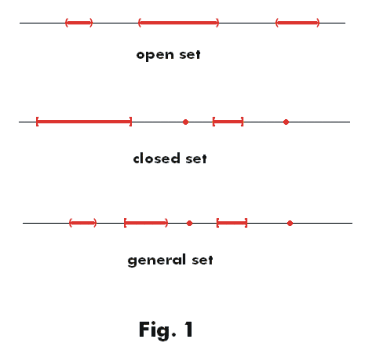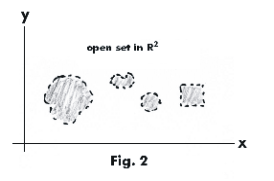Website owner: James Miller
Point sets in one, two and three dimensional space. Types of intervals. Open, closed sets. Continuous mappings.
Point sets in one dimensional space
Def. Interval (of real numbers). An interval of real numbers is the set containing all
numbers between two specified numbers (the end points of the interval ) and one, both, or neither
end point. Example: The set of all values of x such that 5
![]() x < 8 is an interval denoted by [5, 8).
An interval that contains both of its end points is called a closed interval and is denoted by [a,
b], where a and b are the end points. One that contains neither of its end points is called an open
interval and is denoted by (a, b).
x < 8 is an interval denoted by [5, 8).
An interval that contains both of its end points is called a closed interval and is denoted by [a,
b], where a and b are the end points. One that contains neither of its end points is called an open
interval and is denoted by (a, b).
Types of intervals. There are four types of intervals on the real line R:
Closed interval. Interval of type [a, b] containing both end points.
Open interval. Interval of type (a, b) containing neither end point.
Closed-open interval. Interval of type [a, b) containing first end point but not the second.
Open-closed interval. Interval of type (a, b] containing second end point but not the first.
Origin of idea of an open interval. What gave rise to the idea of an open interval? Why is the concept important? Consider the function

What is the domain of definition of this function? We note that the denominator is zero at points x = 2 and x = 5. Thus the function is not defined at those two points (it becomes infinite at those two points). The domain of definition of the function is thus
-
![]() < x < 2, 2 < x < 5, 5 < x <
< x < 2, 2 < x < 5, 5 < x <
![]() .
.
In other words, the domain of definition consists of the open intervals
(-
![]() , 2), (2, 5), (5,
, 2), (2, 5), (5,
![]() ) .
) .
Thus we see the source of the concept of an open interval and the reason for its importance. In investigating the behavior of functions and question of where they behave normally and where they behave abnormally we are led directly to the concept of an open interval.

Point sets in one dimensional space. An open point set in one dimensional space consists of a collection of open intervals, a closed point set consists of a collection of closed intervals and general point set consists of a collection of intervals of any kind. Isolated points are viewed as closed intervals of zero length. See Fig. 1.
Theorem 1. For point sets in R:
1) The union or intersection two open sets is an open set.
2) The union or intersection two closed sets is a closed set.
3) The union or intersection two closed-open sets is a closed-open set.
4) The union or intersection two open-closed sets is an open-closed set.
5) The union or intersection two general sets is a general set.
Theorem 2
1) Let T be the class consisting of all open sets on the real line R. Then the union or intersection of any finite collection of sets in T is also in T.
2) Let T be the class consisting of all closed sets on the real line R. Then the union or intersection of any finite collection of sets in T is also in T.
3) Let T be the class consisting of all closed-open sets on the real line R. Then the union or intersection of any finite collection of sets in T is also in T.
4) Let T be the class consisting of all open-closed sets on the real line R. Then the union or intersection of any finite collection of sets in T is also in T.

5) Let T be the class consisting of all general sets on the real line R. Then the union or intersection of any finite collection of sets in T is also in T.
Point sets in two dimensional space
Point sets in two dimensional space (the plane) consist of regions, curves and points.

Open point sets in two dimensional space. An open point set in two dimensional space consists of a collection of one or more regions where the boundaries of the regions are not included. See Fig. 2.
The points satisfying the equation
x2 + y2 < 25
represent a point set in two-dimensional space consisting of all points interior to the circle x2 + y2 = 25 i.e. an open disk of radius 5 centered at the origin. See Fig. 3. The dashed line in the figure indicates that the boundary is not included in the point set.
Closed point sets in two dimensional space. A closed point set in two dimensional space consists of a collection of regions, curves and points where the boundaries of regions are included. See Fig. 4.

General point sets in two dimensional space. A general point set in two dimensional space consists of a collection of regions, curves and points where portions of the boundaries of regions may not be included. See Fig. 5.
Theorem 3. For point sets in the plane:
1) If A and B are open sets, then the union or intersection of A and B is an open set.
2) If A and B are closed sets, then the union or intersection of A and B is a closed set.

3) If A and B are general sets, then the union or intersection of A and B is a general set.
Theorem 4
1) Let T be the class consisting of all open sets in the plane. Then the union or intersection of any finite collection of sets in T is also in T.
2) Let T be the class consisting of all closed sets in the plane. Then the union or intersection of any finite collection of sets in T is also in T.
3) Let T be the class consisting of all general sets in the plane. Then the union or intersection of any finite collection of sets in T is also in T.
Point sets in three dimensional space
Point sets in three dimensional space consist of regions, surfaces, curves and points.

Open point sets in three dimensional space. An open point set in three dimensional space consists of a collection of one or more regions where the boundaries of the regions are not included. See Fig. 6.
Closed point sets in three dimensional space. A closed point set in three dimensional space consists of a collection of regions, surfaces, curves and points where the boundaries of regions are included.
General point sets in three dimensional space. A general point set in three dimensional space consists of a collection of regions, surfaces, curves and points where portions of the boundaries of regions may not be included.
Theorem 5. For point sets in three dimensional space:
1) If A and B are open sets, then the union or intersection of A and B is an open set.
2) If A and B are closed sets, then the union or intersection of A and B is a closed set.
3) If A and B are general sets, then the union or intersection of A and B is a general set.
Theorem 6
1) Let T be the class consisting of all open sets in three dimensional space. Then the union or intersection of any finite collection of sets in T is also in T.
2) Let T be the class consisting of all closed sets in three dimensional space. Then the union or intersection of any finite collection of sets in T is also in T.
3) Let T be the class consisting of all general sets in three dimensional space. Then the union or intersection of any finite collection of sets in T is also in T.
In the above theorems we have repeated ourselves. They are valid for one, two, three and, in general, n-dimensional space.
Importance of open sets. Why are open point sets in the plane, space, etc. important? Why an interest in them? The answer is that the domain of definition of a function is often an open set. Investigation of properties of functions leads immediately to open sets. Consider the function

This function is undefined at all points where the denominator is zero. It is undefined on the circle
x2 + y2 = 4
Its region of definition is the open region inside the circle
x2 + y2 < 4
and the open region outside the circle
x2 + y2 > 4
This example is from two dimensional space. If we consider the function

we have the same situation in three dimensional space. Here the function is undefined on the sphere
x2 + y2 + z2 = 4
Its region of definition is the open region inside the sphere and the open region outside the sphere.

Continuous mappings. The subject of topology is much interested with continuous mappings of figures. In Fig. 7 a sphere is carried into a pear shape by a bicontinuous (i.e. continuous in both directions), bijective (one-to-one, onto) mapping. What conditions must a mapping meet in order to be continuous? The answer is as follows.
Def. Continuous mapping. A mapping f is continuous at a point x if for any neighborhood W of f(x) there is a neighborhood U of x such that W contains all points f(u) for which u is in U. Such a mapping is continuous if it is continuous at each point of its domain D.
Syn. Continuous function
Jesus Christ and His Teachings
Way of enlightenment, wisdom, and understanding
America, a corrupt, depraved, shameless country
On integrity and the lack of it
The test of a person's Christianity is what he is
Ninety five percent of the problems that most people have come from personal foolishness
Liberalism, socialism and the modern welfare state
The desire to harm, a motivation for conduct
On Self-sufficient Country Living, Homesteading
Topically Arranged Proverbs, Precepts, Quotations. Common Sayings. Poor Richard's Almanac.
Theory on the Formation of Character
People are like radio tuners --- they pick out and listen to one wavelength and ignore the rest
Cause of Character Traits --- According to Aristotle
We are what we eat --- living under the discipline of a diet
Avoiding problems and trouble in life
Role of habit in formation of character
Personal attributes of the true Christian
What determines a person's character?
Love of God and love of virtue are closely united
Intellectual disparities among people and the power in good habits
Tools of Satan. Tactics and Tricks used by the Devil.
The Natural Way -- The Unnatural Way
Wisdom, Reason and Virtue are closely related
Knowledge is one thing, wisdom is another
My views on Christianity in America
The most important thing in life is understanding
We are all examples --- for good or for bad
Television --- spiritual poison
The Prime Mover that decides "What We Are"
Where do our outlooks, attitudes and values come from?
Sin is serious business. The punishment for it is real. Hell is real.
Self-imposed discipline and regimentation
Achieving happiness in life --- a matter of the right strategies
Self-control, self-restraint, self-discipline basic to so much in life